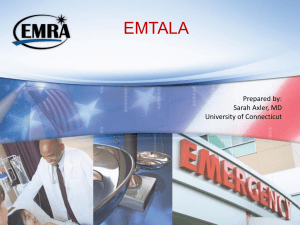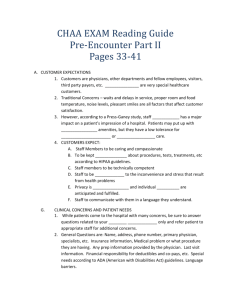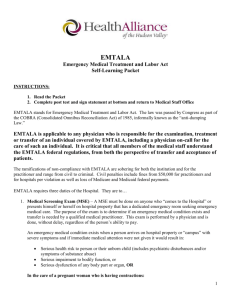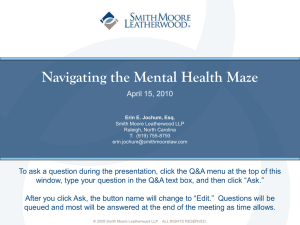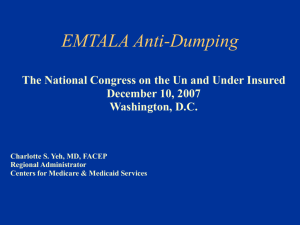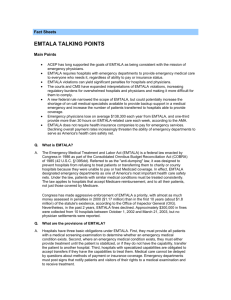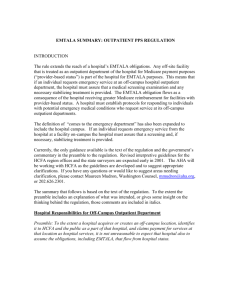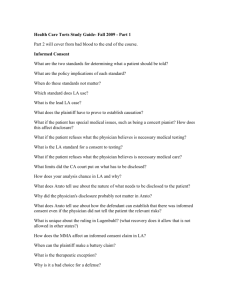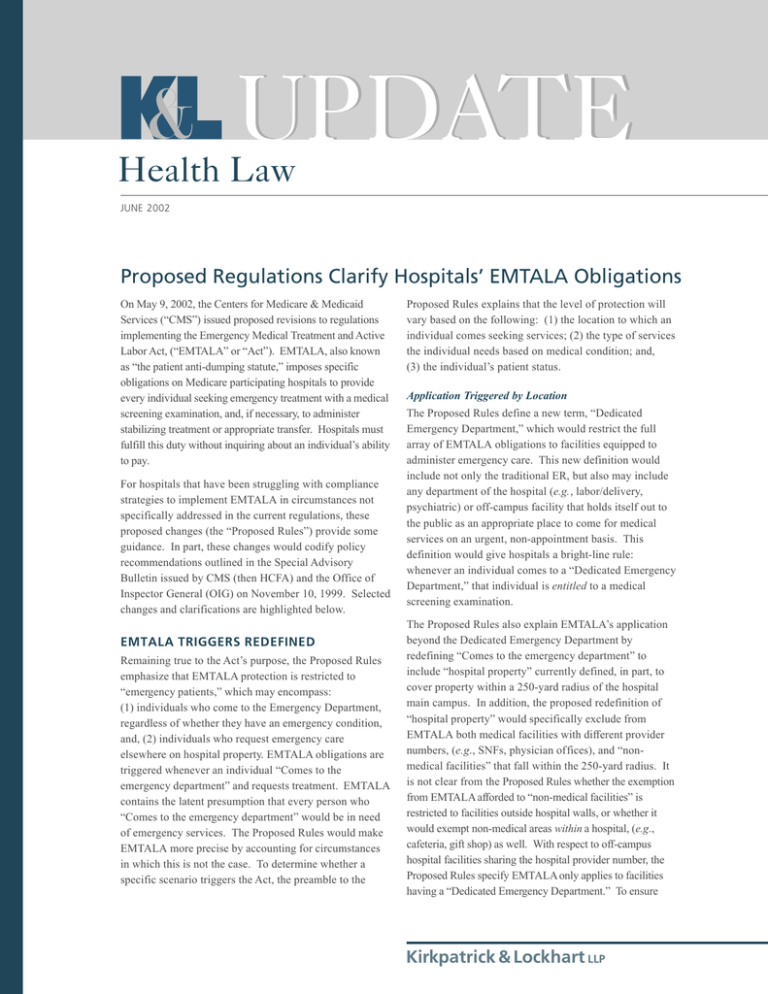
UPDATE
Health Law
JUNE 2002
Proposed Regulations Clarify Hospitals’ EMTALA Obligations
On May 9, 2002, the Centers for Medicare & Medicaid
Services (“CMS”) issued proposed revisions to regulations
implementing the Emergency Medical Treatment and Active
Labor Act, (“EMTALA” or “Act”). EMTALA, also known
as “the patient anti-dumping statute,” imposes specific
obligations on Medicare participating hospitals to provide
every individual seeking emergency treatment with a medical
screening examination, and, if necessary, to administer
stabilizing treatment or appropriate transfer. Hospitals must
fulfill this duty without inquiring about an individual’s ability
to pay.
For hospitals that have been struggling with compliance
strategies to implement EMTALA in circumstances not
specifically addressed in the current regulations, these
proposed changes (the “Proposed Rules”) provide some
guidance. In part, these changes would codify policy
recommendations outlined in the Special Advisory
Bulletin issued by CMS (then HCFA) and the Office of
Inspector General (OIG) on November 10, 1999. Selected
changes and clarifications are highlighted below.
EMTALA TRIGGERS REDEFINED
Remaining true to the Act’s purpose, the Proposed Rules
emphasize that EMTALA protection is restricted to
“emergency patients,” which may encompass:
(1) individuals who come to the Emergency Department,
regardless of whether they have an emergency condition,
and, (2) individuals who request emergency care
elsewhere on hospital property. EMTALA obligations are
triggered whenever an individual “Comes to the
emergency department” and requests treatment. EMTALA
contains the latent presumption that every person who
“Comes to the emergency department” would be in need
of emergency services. The Proposed Rules would make
EMTALA more precise by accounting for circumstances
in which this is not the case. To determine whether a
specific scenario triggers the Act, the preamble to the
Proposed Rules explains that the level of protection will
vary based on the following: (1) the location to which an
individual comes seeking services; (2) the type of services
the individual needs based on medical condition; and,
(3) the individual’s patient status.
Application Triggered by Location
The Proposed Rules define a new term, “Dedicated
Emergency Department,” which would restrict the full
array of EMTALA obligations to facilities equipped to
administer emergency care. This new definition would
include not only the traditional ER, but also may include
any department of the hospital (e.g., labor/delivery,
psychiatric) or off-campus facility that holds itself out to
the public as an appropriate place to come for medical
services on an urgent, non-appointment basis. This
definition would give hospitals a bright-line rule:
whenever an individual comes to a “Dedicated Emergency
Department,” that individual is entitled to a medical
screening examination.
The Proposed Rules also explain EMTALA’s application
beyond the Dedicated Emergency Department by
redefining “Comes to the emergency department” to
include “hospital property” currently defined, in part, to
cover property within a 250-yard radius of the hospital
main campus. In addition, the proposed redefinition of
“hospital property” would specifically exclude from
EMTALA both medical facilities with different provider
numbers, (e.g., SNFs, physician offices), and “nonmedical facilities” that fall within the 250-yard radius. It
is not clear from the Proposed Rules whether the exemption
from EMTALA afforded to “non-medical facilities” is
restricted to facilities outside hospital walls, or whether it
would exempt non-medical areas within a hospital, (e.g.,
cafeteria, gift shop) as well. With respect to off-campus
hospital facilities sharing the hospital provider number, the
Proposed Rules specify EMTALA only applies to facilities
having a “Dedicated Emergency Department.” To ensure
Kirkpatrick & Lockhart LLP
hospitals meet their EMTALA obligations off-campus, the
Proposed Rules would add a requirement to the Conditions
of Participation that all off-campus facilities implement
policies to properly assess and refer individuals with an
emergency condition.
Application Based on Emergency Medical Condition
For individuals who come to hospital property other than
the “Dedicated Emergency Department,” an individual
must either request emergency care or exhibit a need for
emergency care according to the “prudent layperson
observer” to trigger a hospital’s obligation to provide a
screening. Hospitals are thus given specific direction that
ties the extent of EMTALA protection and obligation to an
individual’s manifested need for emergency care. Once a
hospital has satisfied its screening obligation, the
Proposed Rules clarify a hospital’s additional EMTALA
obligations to provide stabilizing treatment or appropriate
transfer are triggered based on the severity of the medical
condition. So, for example, a person who comes to a
Dedicated Emergency Department with a cold triggers the
hospital’s screening obligation, but, absent other
complications discerned from the screening, would not
trigger treatment or transfer obligations.
Application to Inpatients and Outpatients
ON-CALL PHYSICIAN REQUIREMENTS
Offering welcome direction, the Proposed Rules also
clarify EMTALA’s on-call physician requirements. The
Proposed Rules would permit hospitals greater flexibility
in formulating their on-call policies, requiring only that
the hospital maintain an on-call list in a manner that “best
meets the needs of its patients” given its resources. The
preamble clarifies that all specialties need not be
represented and that hospitals will not be required to
demonstrate specific ratios of on-call capabilities. The
preamble also indicates that physician exemptions from
on-call are permissible. Hospitals would satisfy their oncall EMTALA obligations under the Proposed Rules by
implementing policies that address contingencies when a
particular specialty is unavailable, or an on-call physician
is unexpectedly unable to respond to call.
NEXT STEPS
CMS encourages interested parties to comment upon the
Proposed Rules before July 8, 2002; CMS is particularly
interested in feedback from physicians and emergency
department personnel regarding the likely workability of
the proposed changes in real-world situations. CMS has
stated it expects to publish these rules in final form by late
August 2002.
The Proposed Rules also differentiate among inpatients,
outpatients and individuals with no current treatment
relationship with the hospital. The preamble to the
Proposed Rules expressly states that EMTALA has no
application to existing in-patients, to patients presenting
for elective treatment, or to outpatients with scheduled
appointments. The rationale for this limitation, according
to CMS, is that these categories of patients fall outside
EMTALA’s protection as they lack an urgent medical
condition necessitating immediate care. The extent to
which EMTALA applies to individuals who, based on the
screening, are admitted to the hospital as inpatients, depends
upon the admittee’s condition. Once the admittee is
stabilized sufficiently for safe transfer, a hospital has
discharged its duties under EMTALA, regardless of whether
it actually discharges the patient. The preamble explains a
hospital’s EMTALA obligations cease once an individual is
admitted and thus protected under the Conditions of
Participation and other obligations embedded in the hospitalpatient relationship.
LUCINDA C. GLINN
Associate, Harrisburg Office
lglinn@kl.com
717.231.5846
FOR MORE INFORMATION, please contact the author
or one of the following K&L lawyers:
Boston
R. Bruce Allensworth ballensworth@kl.com 617.261.3119
Edward J. Brennan
ebrennan@kl.com
617.951.9143
Harrisburg
Ruth E. Granfors
Raymond P. Pepe
rgranfors@kl.com
rpepe@kl.com
717.231.5835
717.231.5988
Miami
Marc H. Auerbach
William J. Spratt
mauerbach@kl.com
wspratt@kl.com
305.539.3304
305.539.3320
Newark
Stephen A. Timoni
stimoni@kl.com
973.848.4020
Pittsburgh
Judy J. Hlafcsak
jhlafcsak@kl.com
412.355.8920
Edward V. Weisgerber eweisgerber@kl.com 412.355.8980
Washington Alan J. Berkeley
aberkeley@kl.com
202.778.9050
®
Kirkpatrick & Lockhart LLP
Challenge us. ®
www.kl.com
BOSTON
■
DALLAS
■
HARRISBURG
■
LOS ANGELES
■
MIAMI
■
NEWARK
■
NEW YORK
■
PITTSBURGH
■
SAN FRANCISCO
■
WASHINGTON
.........................................................................................................................................................
This publication/newsletter is for informational purposes and does not contain or convey legal advice. The information herein
should not be used or relied upon in regard to any particular facts or circumstances without first consulting a lawyer.
© 2002 KIRKPATRICK & LOCKHART LLP.
ALL RIGHTS RESERVED.

